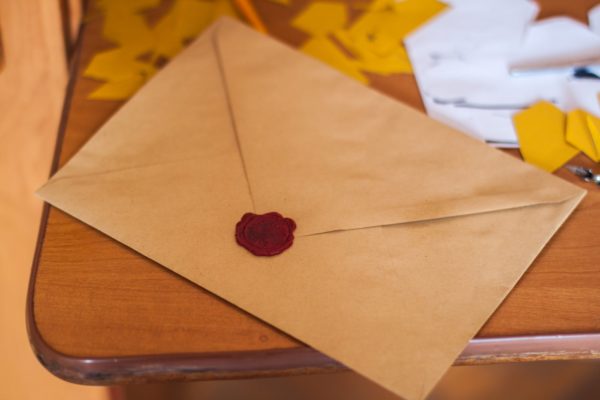SOLDIER DOWN
Under the sun umbrella on the patio deck, fanning herself to keep the heat off, Milly reads correspondence from long ago.
“These dog days in New Britain are all the same, a quiet silence before the storm.” The penmanship is poor, but the words are discernible. “We await orders to move on, to save our country, to die.” When she first reviewed this note, Milly wondered if the soldier did indeed move on, did indeed meet his death. She wonders if, now, the intended recipient should enjoy rightful possession of the paper held in her hand.
Her tools, in 1943, were a sharp pen knife and a thick, black marker. Sometimes she wiped out the violating word or two in a thick, sweeping stroke. If an entire section or paragraph needed to be extracted, extract she did with the knife. Most letters she censored went on to their destinations. Some did not, and were never returned. Some, now, lay high on a table in front of her, under the sun umbrella. The letters she has wereconfiscated by the Government, confiscated by her — she was the Government.Working for the Office of Censorship in the 1940s, they were black letters, carrying too much information, written by U.S. soldiers overseas.
They varied — the reasons Milly kept them. The only quality the letters had in common was blatant disregard for the “Loose Lips Might Sink Ships” campaign, the slogan of World War II advising military staff to keep certain things to themselves. But this wasn’t why Milly took the letters; she could just as easily have destroyed them.
Here they are with her, on the wooden patio, and she reads one after the next many years later, their authors dead from the war, dead since the war, or likely dead soon. Milly is looking at them now because she will be moving next week, to a home for the elderly. She doesn’t know if she can bring the letters along. Space is tight, like army barracks.
The phone rings. Louise, Milly’s daughter, is calling.
“The dumpster should be coming later today,” Louise says.
“I don’t have that much stuff,” Milly says.
“They will be parking it in the driveway.”
“There really isn’t a lot to throw out.”
“Show the men the heavy things. They’ll put them in the bin for you. It’s part of their job.”
Imagine a scene in black and white: It is 1943. The office of the censors’ is one spacious room, hot summer air whisking around large floor fans, an office like any other office, this one in Manhattan. Envelopes of all shapes and sizes arrive from the world over and are dropped in landing baskets on the tops of desks, ready for review.
The objectives of the censor were threefold:
–Eliminate any information that could be useful to the enemy
–Eliminate any information that could discourage recruitment into the military
–Eliminate any false information that could alarm or depress a credulous public
And she performed her job well, Milly did. Picture her now in black and white: the brazen hand, nail polish on each fingertip, fingers dangling the marker, the pen knife, waving the implements about as she read letter upon letter. Paper shuffling, air whisking, fan blades whirring.
“On our trip through Italy I can only say I was happy.” Milly reads one neatly-written note from a second lieutenant. “Because you, I believe, were happy too. You had so much hunger for architecture, mania for looking at every building in every street, every square. It didn’t mean much to me, what you were studying intensely; what I enjoyed most was your joy.”
Such a romantic, this one, Milly thinks. She wondered about whom the man waswriting. A mistress? A woman met on a weekend off the military base, now returned to the US? Often, she tried correlating notes from the same sender. Yes, sometimes she’d see it: one letter to the wife, another to a woman who frequently collected more affection. She’d even seen the same exact letter written to multiple women.
Milly quickly dismissed resentful thoughts, though, and the dismissals came rather easily. Curiosity was all. When Milly read of injured soldiers or bereavement for a felled comrade, she wanted to take her heart out – reach deep into her chest cracked open with sheer fingernail strength – and mail the beating organ to the return address on the envelope. Often, the origin of a letter was a hospital, and the person scribing was a woman volunteer of the Red Cross. Sitting beside a wounded soldier, she’d capture his every word, describing how he sustained injury, sometimes with details too gruesome for a State-side relative to bear.
Another phone call, this one from Carol, a neighbor who gave Milly eucalyptus cuttings recently.
“I love smelling them,” Milly says.
“I am going to miss you,” Carol says. “You were a good friend.”
“I’d like to stay, but the doctor says…”
“I know.”
“I’d go against his advice. I really would. My kids, though, just won’t have it,” Milly says.
“You have two caring children.”
“You want them? Take them. And their spouses. Even the grandchildren, if you like.”
Researchers estimate that about one out of five American women over the age of fifty have osteoporosis. About half of all women over the age of fifty will have a fracture of the hip, wrist, or portion of the spine. The condition occurs when the body fails to form enough new bone.
Milly knows this. Her doctor knows it. Her children know it.
“There are only so many times you can fall before you will do permanent and immobilizing damage,” all three have told her many times.
She’s even fallen onto her walker. That one gave her a black eye and took four weeks to heal. On her knees: cuts, bruises, scrapes.
Milly shared the house with her husband, Lawrence, for thirty years. She’s lived there thirty more after his death. To her, the house was a fortress, nestled in the woods of Long Island. She never remarried, thinking it would have been a supreme injustice to Lawrence. Her children insisted it was fine to “get hitched again; the church allows it,” and even though she faithfully attended Mass every Sunday and knew this, she still thought it was very wrong. “And what happens when we’re all in Heaven?” she said. “We have a threesome?”
And so, Milly milled about these many years in the empty house, and was quite content, she being the first to say so. She was popular with the neighbors, was a member of many clubs, her favorite being the Gold Coast Historic Society, an organization for the preservation of old or abandoned mansions in the area. Several years ago, she won three successive rounds on First Friday Bingo Night in her parish.
But now she doesn’t leave the house much. An Extraordinary Minister visits every Sunday morning to bring her Communion. The supermarket delivers. And the Tuesday Meals on Wheels program knows Milly’s address. She falls often. She pulls herself back up.
She comes to a letter saved for a reason other than what had been written therein. It was in the outgoing mail bin on her desk in 1943, intended for a soldier in England. Most of what she censored was incoming correspondence, and rarely did she or a fellow worker need to confiscate anything leaving the country. But this one was Victory-Mail, from the soldier’s fiancée, and had a lipstick kiss on it, the abbreviation SWAK – Sealed With A Kiss – written in the corner. V-Mail letters were reduced to small strips of microfilm prior to shipment, to speed delivery, and lipstick would cause the paper to jam in the machine.
She was about to discard the letter but noticed the stamp: an image of an inverted biplane. Milly thought it was rather odd the aircraft was upside-down, and showed it to a manager in the office who was acquainted with all things postal. “It’s a valuable stamp,” he said. “The Post Office printed it in error in 1918.” The man took off his glasses and looked closely at the image. He shook his head. “How it got on an envelope twenty-five years later is beyond me. Save it,” he said. She did.
This manager was kind to her for the few years they worked in the same office. Confiscated letters were government property; censors weren’t allowed to keep them or take them home. But Milly was moved by the voices in these notes, notes she knew would never make their destination, would be locked up until declassification and subsequently destroyed. She thinks the manager may have known she pocketed one once in a while, and simply looked the other way.
The phone is ringing again. It is Milly’s son David.
“How are you feeling, Mother?”
“Fine, David. How are you?”
“Fine,” he says. “Have you been taking the medication?”
“Yes. Have you seen the doctor about your back?”
“I will,” David says.
“You ask me to take the medication and I take it,” says Milly. “I ask you to get your back checked, and you say you will, not you did.”
“I’ve been meaning to. It is on my list,” David says. “Louise told me you don’t want to throw anything out. Is the dumpster there?”
“It is here. The men asked me what they can haul into it.”
“And what did you tell them?” David says.
“Nothing.”
“You did not answer them?”
“I did answer them. I said ‘Nothing.’”
Soldiers fighting in World War II were a part of Milly’s life, simply by virtue of her reading their correspondence sent home to loved ones and friends. She fell in love with these men. She wanted to be a part of their families. Very often she saw the admiration and respect soldiers had for those fighting ahead of them in the invasion, near enemy lines. On fronts not yet named in foreign lands, good men were taken down. Who would marry the girls they would have married? she thought. Or build the things they would have built?
A medic in the Philippines wrote, “When I heard ‘Soldier down’ I looked out into the field and saw him, writhing on the ground. I gathered my equipment and started to go out there but Sergeant tackled me and said to wait until the fighting is over. The Japs are shooting everyone, even those of us without weapons.”
From another medic, “We were rushed out to pick up a boy whose leg was blown off. As I got closer, I wanted more and more to avoid looking, but then I felt some kind of super-strength take over. The life of this boy depended on me; I needed to focus, to do what I had to do. After that, I was ready for anything.”
Infantrymen told of their respect for Aid men, those medics with one of the roughest jobs, attending to soldier buddies critically wounded in the field. Many of these letters, though true to the soul and core of the war, Milly simply could not pass on to be delivered. Sometimes conscience reigned over rules.
She fell in love with all of the soldiers, even those writing about Polynesian native girls who were perpetually barefoot, wore bandannas, close-fitting pareus, frangipani in their hair, girls having “a smile that brimmed with an inner merriment.” Was it because of the American inhabitants on the girls’ island? “Her skin is dark and glistens in the sun. I know, with her as my wife, I will be happy forever,” Milly reads. This soldier was writing to his parents.
And the parties she attended, at the time she was working in Manhattan. Her husband, Lawrence was a civil engineer, ten years older than Milly. He worked on the Museum of Modern Art project, knew many people, and the two of them socialized in wide circles. Invariably, there were questions about war correspondence, and Milly would be asked to talk about what she came to read most recently.
“Our office helped crack the case of the Dickinson Doll Woman,” she told party guests. They’d put down their drinks to listen. “She operated a doll shop in New York, and was sending messages to the Japanese disguised as information about dolls. We were told to be on the lookout for correspondence to South America, particularly anything having to do with toys. I think the woman is locked up now. The FBI got her.”
“Tell us more,” the party guests said.
Milly wanted to. But she wasn’t sure how much information she could disclose. Soldiers were entitled to their privacy. In addition to the letters, there were the usual shenanigans, as she liked to call them: censors who changed wording for their own amusement. Criminal to do such a thing, Milly knew. She kept her mouth shut in the office, and at the parties simply said, “There are some ugly situations, about which I can express no opinion.”
Milly takes a reading break. On the deck, under the umbrella, a calm, peaceful backyard that was hers for sixty years spills its compassion to someone who has sold it away. The house closing is in two weeks.
There she sees the Eastern White Pine, given to her from Louise and David, with love, on her fiftieth birthday. When they buried the burlap ball underground, the tree rose two feet. Now it is three stories high.
There she sees the iron post at the edge of the property, once serving as the end of a clothesline, shared by adjacent neighbors. No longer needed — replaced by a noisy gas dryer, which, in turn, was replaced by another, and then another over the years.
And the birdhouse David made in ninth grade wood shop still hangs in the larch tree, though its roof is mostly chewed away, the result of a combined effort, over time, of woodpeckers, squirrels, and pellets of hard rain.
Louise calls again.
“I’ve changed my mind about the dining set,” she says. “Are the men there, hauling out stuff to the bin?”
“They are not,” Milly says.
“Where did they go? David told me the dumpster arrived.”
“Home, I guess.”
“You did not tell them what needs to be thrown out?”
“I asked if they wanted anything.”
Louise sighs.
Milly continues. “You were saying? About the dining room set?”
“I was going to say that you can tell the men to throw that out too. I changed my mind. I don’t think the set will work for me.”
“We can donate it,” Milly says.
Another sigh.
“Mom, you need to be out of there in two weeks. We can’t give other people your things that quickly.”
“They have this take-away truck. St. Vincent de Paul. The volunteers can come and load everything, and give it to needy families. The country is in a bit of a recession, last time I checked.”
“You have to schedule it,” says Louise. “They need advance notice.”
“I never said I wanted that bin,” Milly says. “It’s unsightly. The neighbors are going to complain.”
She was living in Queens when she worked for the Office of Censorship. She met Lawrence as part of a church group that met on Thursday evenings. But it wasn’t anything that happened inside the church that caused their eyes to lock onto each other’s. One night, when everyone was leaving, the air-raid siren sounded. Scared, she didn’t quite know how to react, as lights in the buildings along the street were extinguished. A warden in a white helmet shuffled them along, and a gentleman from the church group came to her, asked her how far she had to walk. He stayed alongside Milly for the five blocks, left her on her doorstep. He said, “I’m Lawrence. See you next week?”
And so they saw each other the following Thursday, and for weeks after that, with Milly putting trust in this man who treated her kindly, opening doors, telling her to watch her step, listening to what she had to say. They prayed together on Sundays, and started seeing each other on Saturdays as well. A confidence grew in Milly, something she never had – no serious boyfriend or lover to this point in her life, age: twenty.
In years prior, Milly wondered what it was like to be beautiful. Now she no longer wondered; she knew. Lawrence made it very clear in the little things he said. “Some girl smiles at you and it’s a whole new day” – Lawrence’s greeting as he met her one morning for a visit to the park. “Math, science, history, logic – none of this figures into what we have, how we came together. There is only fate and magic,” – another of Lawrence’s proclamations that swept Milly away.
Swept away she was, after just a few months, and she soon started rationalizing her chaste behavior up to this point in her life. She admitted to still being a virgin, as if defending herself: “I’m not one to be found tumbling out of woods with new lovers all the time.” And, as most could guess, it wasn’t long until she broke the Catholic rule of abstinence before marriage. That Saturday evening found her at Confession.
“Bless me Father, for I have sinned. It has been two months since my last confession.”
“Yes,” the priest said. “What have you to confess?”
“I have committed a grave sin.”
“What is the sin?”
She paused, shook her head. “I suddenly cannot bring myself to say, Father.”
“I cannot give you absolution unless you tell me the nature of your transgression.”
Tears came to her eyes. She could not say it aloud, even to God.
“Father, I… I.” Silence.
“There is nothing I can do for you then, child. Pray for the strength to confess.”
She nodded. “I will. Thank you.”
Weeks passed and this strength was never acquired. But Lawrence eased the worry about living in sin. He brushed her hair to the side, held her hand, said, “I want to take you away, to some place warm and sunny, a shoreline, perhaps. I want to swim with you in a pond of big fish, play checkers with crab shells, lie in a hammock under a broad-leafed tree by the water. Just you and me, forever.”
“This is your way of saying you want to get married?” Milly said.
“It is,” Lawrence said.
The wedding was eleven months later, in a quaint, port-side restaurant overlooking Long Island Sound.
Another phone call.
Milly counts the rings, guessing it will stop after seven.
Eight.
Nine.
She picks up more letters to read. Milly had always noticed the wide range of viewpoints in them; war sentiment went from one extreme to the other, and left her somewhere in the middle, undecided, neutral. A corporal stationed in France in 1945 wrote, “Eighty-six percent of U.S. citizens want unconditional surrender of the Japanese. These are people that have no clue what it is like to see combat, not the slightest. Try to imagine them running for cover as 88s screaming over their heads strafe the ground, everything in sight.”
Another wrote, “What a world we live in. I guess you’ve heard about Hiroshima. God, how I hate to hear about innocent people being victims.”
But for every letter such as these, Milly also reads of the joy expressed by fighting men who have just learned the war is over. “We are saved,” a private first class wrote. “I would have surely been the next to perish in the march northward had Truman not made the decision. We are truly lucky, sweetheart. I am coming home.”
Another wrote what seemed like words of wisdom to her: “Every significant success is preceded by significant failure or loss.”
All you can do, Milly thought during the war, is put trust in those people who apparently know more than you. You can only live in the hope that the decisions made were indeed the best ones.
Here is a soldier writing from the U.S. to his buddies still overseas. Back from his time spent in the Philippines, he says, “I got terribly sick a month after returning. It took three doctors to figure out what I had: malaria. When you get home and stop taking Atabrine, watch out! That’s when you finally catch the disease.” She thought this would discourage soldiers still fighting, so she withheld the letter and, instead, went to the local health clinic after work that day. “Take note of this,” she told the head nurse. “Please spread the word.”
She counts them now, these letters on the table on the wooden deck: twenty-six. The pile constituted the smallest fraction of those she read at work in the 1940s, which, in turn, were only the smallest fraction of those processed by all the offices. Over a million incoming and outgoing pieces of mail were censored each week in those days, throughput higher than Milly would have guessed. Often multiple letters – sometimes as many as six or more – landed in the intended recipient’s hands on the same day, while sent over the course of a month or more.
“Your letter took three months to reach me,” one soldier wrote, “because you had the wrong A.P.O. number. I don’t know how they finally routed it to me. Please don’t do that again.” Milly could see the anger in this man, who like many, were desperate for communication. To some, it seemed the most important element of their lives, at the time. Another important aspect, Milly learned, was the acquisition of medals and points; some soldiers were determined to get as many as they could, via any method possible, even if not altogether legitimate.
“I want the Combat Infantry Badge,” Milly reads, “the one with the wreath. The war, to me, means nothing without engaging the Germans and having the badge to show it.” Another wrote, “We received the Presidential citation, a blue ribbon to wear on the right breast, but it doesn’t carry any points. I won’t be coming home any sooner.”
She imagines some badges now in frames on the mantels of soldiers’ children. Others locked away in closets. Others tossed out, some mistakenly, some with tearful regret.
The doorbell is ringing. Milly is careful getting up. She feels especially weak today. She slowly makes her way to the front of the house, and expects those at the door to wait patiently.
It is Carol, the neighbor.
“Your children are trying to reach you,” she says. “Both of them called.”
“Not surprised,” Milly says. “I am sorry they bothered you.”
“No trouble,” Carol says. She points to the bin. “What is that?”
“That is where the contents of this house are supposed to go.”
Carol raises her eyebrows.
“You weren’t kidding when you told me last month to take anything I wanted,” she says.
“The offer still stands,” Milly says. “Would you like to come in and look around again?”
“Indeed I might,” Carol says, as she walks through the doorway.
Milly follows her into the kitchen.
“It’s not unlike the lone soul of an old home dying,” Milly says. “The family takes the dead body away. There is a wake. There is a funeral. Some flowers. Some prayers.” They sit at the kitchen table. “A month later a bin arrives in the driveway. A son or daughter or estate agent rummages through all the rooms, takes a few items, leaves. The rest makes its way to the bin, gone forever.” She looks out the window. “The only difference here is — I’m not dead yet.”
Once Carol is gone, Milly sits down again at the table on the deck. She reads one more letter. “I have some gray hairs now. It isn’t worry that has put them there. I don’t worry. I blame it on a vitamin deficiency. I think the real change in me, though, is my attitude and outlook.”
Milly looks out at the property line of her home. Tall pine trees in a single row mark the boundary. The backyard, years ago, was twice as deep. Shortly after moving in with Lawrence, they subdivided the land and planted small trees along the division.
“No, I am not cynical or bitter,” she reads, “like the way some others are becoming. Nor am I rebellious. I’ve learned to accept everything, no matter what, in a quiet way. I do what I need to do, what is expected of me.”
Imagine the scene in black and white: a peaceful backyard in the suburbs, a calm before a storm, just as some soldiers had written.
“But I miss home,” the letter continues. “I didn’t know what to expect when I was taken into the war. I suppose I’m still figuring it all out. It all still lies ahead of me.”
Stacking the wartime letters in a neat pile, Milly wonders if she can part with these soldiers, these ghosts of fighting men who did their part to keep the country strong in a time of crisis.
After World War II, military censorship ended. The concept of self-censoring was instituted; those overseas bore the responsibility of policing themselves and protecting their comrades’ well-being. When the office closed, not many years after it opened, Milly was concerned for those fighting in future wars, hoping the correspondence they kept – something so significantly a part of their lives – preserved their safety.
Through the years, she wondered if tragedies of soldiers taken down in Korea, Vietnam, and elsewhere, could have been avoided had units been more careful about what they wrote to loved ones. Holding their letters, she wants to stand beside these men, these ghosts, wearing the wreath on the combat badge high on the breast.
Fiction of Joseph Levens’s has appeared in Gettysburg Review, AGNI, Zone 3, Meridian, Cream City Review, and many other places. He has yet to publish a full-length book, but his collections and first novel have garnered nice words and finalist awards from reputable outfits.




